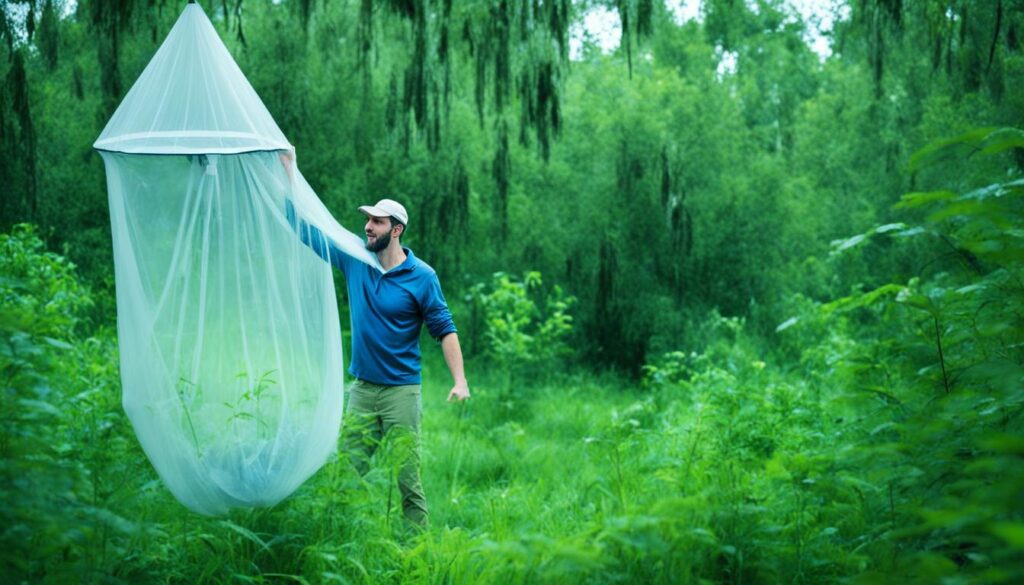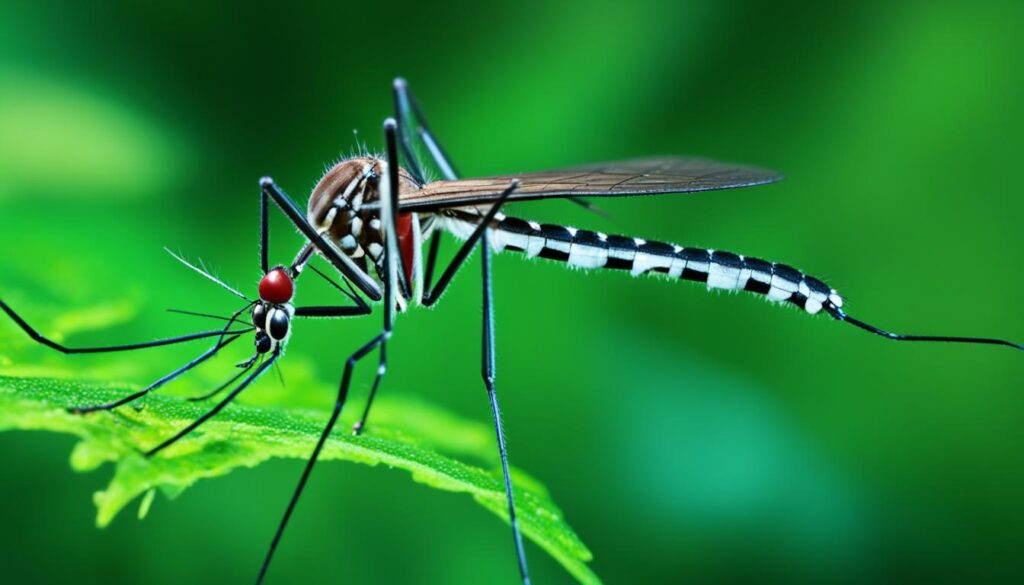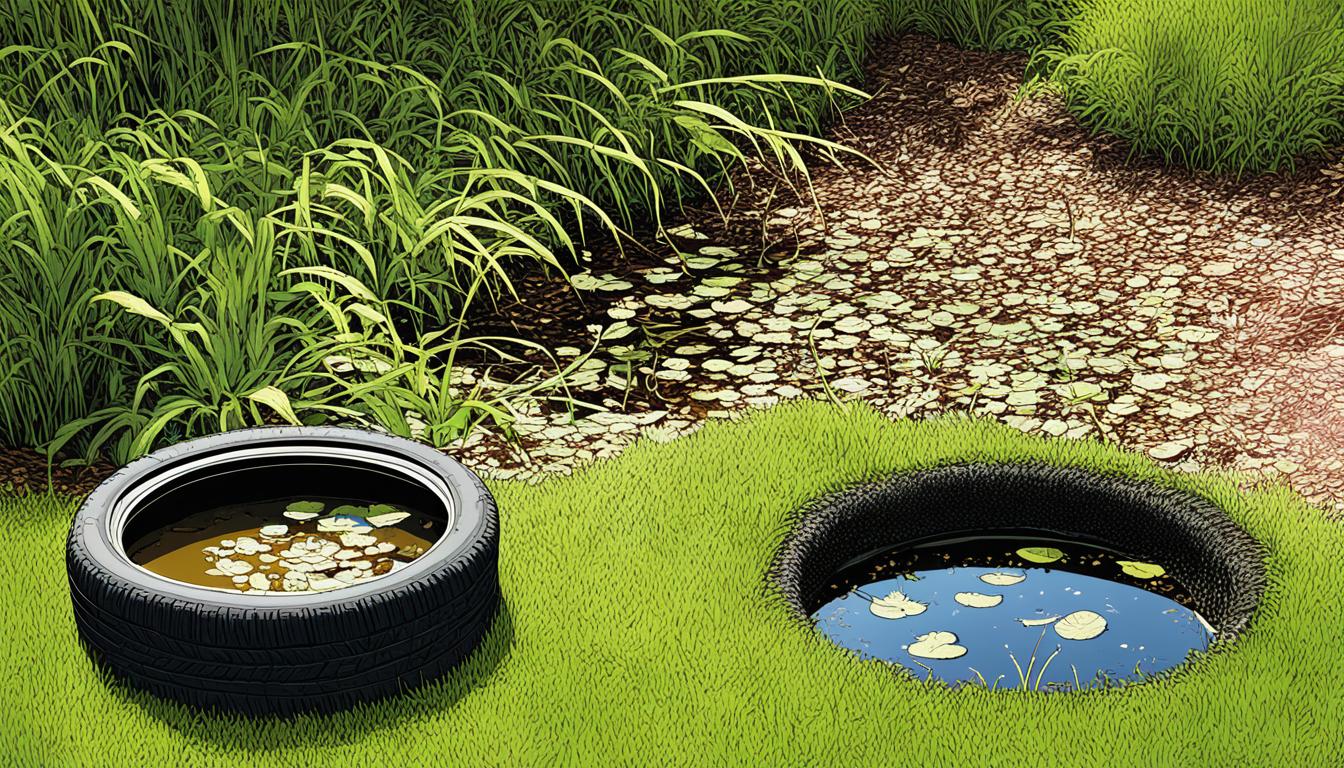With the weather getting warmer, you might see more mosquitoes in your backyard. These pesky bugs can carry diseases, putting your health at risk. However, knowing where they hide can help you keep them away more effectively. Let’s look at where these bugs like to hide.
Key Takeaways
- Mosquitoes thrive in areas with standing water, which serve as their breeding grounds.
- Dense foliage and shaded areas provide mosquitoes with the perfect hiding spots during the day.
- Mosquitoes can hibernate or lay dormant eggs during the colder months, only to reemerge when the weather warms up.
- Identifying and addressing mosquito harborage areas around your home is crucial for effective mosquito control.
- Professional mosquito control services can help eliminate these pests and protect your family from mosquito-borne diseases.
Introduction to Mosquito Hiding Spots
Mosquitoes are not just annoying; they can also be dangerous to our health. Knowing where they hide is key for mosquito control. It’s vital to learn their favorite spots and what attracts them to these places.
Understanding Mosquito Behavior
Mosquitoes are quite interesting. They love carbon dioxide and body heat. This is how they find us. Female mosquitoes need blood to lay eggs. They hide in dark, humid areas. This makes finding their hiding places very important.
Importance of Knowing Where Mosquitoes Lurk
Knowing their hiding and breeding spots is crucial. It helps with mosquito prevention. By finding and getting rid of where they rest and breed, you can lower their numbers. This also reduces the risk of mosquito diseases. Such info lets you make your outdoors safer and more fun.
Mosquitoes can breed in very small amounts of water. So, always check for and remove any standing water at your place. Knowing their behavior and where they hide helps a lot. It means you can keep them away effectively. This way, you can protect yourself and your family.
Standing Water: A Prime Mosquito Breeding Ground
Standing water is a mosquito’s favorite spot. They lay eggs and breed there. It doesn’t matter if it’s a tiny puddle or a big pond, any still water is a risk. This danger could be right in your backyard, threatening your family.
Types of Standing Water Sources
Mosquitoes breed in various places, even where you least expect. Things like:
- Puddles and small depressions in the ground
- Bird baths, pet dishes, and other outdoor water containers
- Clogged gutters and downspouts
- Abandoned tires, buckets, and other discarded containers
- Flowerpot saucers and other garden items that collect water
- Ornamental ponds and water features
- Backyard swimming pools that are not properly maintained
Even as small as a bottle cap can be a breeding spot for Aedes mosquitoes. These are ones that can carry Zika virus. To keep your family safe, remove all standing water around the house.
Eliminating Standing Water to Reduce Mosquito Populations
To control mosquitoes, remove their water. Here’s what you can do:
- Empty and clean bird baths, pet water bowls, and similar items weekly.
- Clean out gutters to stop water from standing.
- Flip over or cover unused items that might catch water.
- Keep pools clean and treated.
- Fill or drain low spots in the yard to stop water collection.
With no standing water, you can stop mosquitoes from laying more eggs. This protects your family from mosquito diseases.
Dense Foliage: A Favorite Mosquito Hiding Place
Dense foliage is a top spot for mosquitoes to hide. They like the shade under leaves. This lets them stay cool and out of sight.
To reduce these bugs, cut back thick plants around your house. Short grass and trimmed bushes help. This makes your yard less attractive to mosquitoes.
- Mosquitoes love shady, wet areas near dense plants and long grass.
- Clear overgrowth and keep your yard neat to get rid of hiding spots.
- Always remove any water that collects in items like birdbaths. This will stop mosquitoes from living near you.
By managing plants and keeping things dry, you can fight off mosquitoes. This way, your yard is more pleasant and less buggy.
Don’t forget about other ways to control mosquitoes. These include removing their resting spots and breeding places. Also, protect yourself when outside.
Where Do Mosquitoes Hide?
Mosquitoes cause a lot of trouble outdoors. They can disrupt fun and even spread diseases. It’s important to know where they like to hide. This helps to control and prevent mosquito problems. We will look at where mosquitoes usually hide around the house. And we’ll learn how to deal with these areas.
Common Mosquito Hiding Spots Around the Home
Mosquitoes find secret places all around your home. They love areas with water that doesn’t move, like gutters and bird baths. Even in small puddles, they can lay eggs and grow their numbers. Thus, it’s a key hiding spot for them.
Also, you’ll find mosquitoes in thick bushes and grass. This kind of area gives them shade and protection. Since mosquitoes are weak fliers, they hide from the wind as well.
Identifying and Addressing Mosquito Harborage Areas
Finding and dealing with their hiding spots is essential. First, check your whole property for standing water. Look at gutters, bird baths, and anywhere else water can collect. Regularly cleaning or treating these spots can help.
Then, focus on your yard’s landscaping. Mosquitoes like tall grass and dense plants. Keep your yard neat by mowing and cutting back greenery. Also, clear away any waste. This makes your yard less inviting for them.
If mosquitoes keep coming back, you might need professional help. Pest control experts can find and treat difficult mosquito areas. They can also make a plan that fits your home’s needs.
By knowing where mosquitoes hide, you can make your yard safer. With a few changes, you can lower the mosquito threat. This means more fun outside without worrying about diseases they carry.
Mosquito Life Cycle and Habitat
It’s important to know about mosquitoes’ life cycle and where they like to live for good control. Mosquitoes spread diseases and grow in specific environments. These factors are closely linked.
Understanding the Mosquito Life Cycle
Female mosquitoes lay their eggs in water from ponds to small containers. Their eggs hatch quickly, in just a few days. This process makes mosquito larvae.
The larvae grow, molt a few times, and become pupae. From the pupae, adult mosquitoes emerge. Then, the adults start the cycle again.
Some mosquitoes, like Aedes, complete their life cycle in a week. This quick turnaround makes them hard to manage. A single female can lay over 100 eggs at a time. This contributes to their fast population growth.
Preferred Habitats for Different Mosquito Species
Mosquitoes can live in many places, from rainforests to the Arctic. But each type has its favorite spot. For example, some like breeding in long-standing water, while others choose moist soil.
Some mosquitoes prefer living close to people. The Aedes, for example, like cities and suburbs. They breed in water-holding containers near homes. Others prefer wild areas like forests.
Understanding where and when different mosquito species breed is key. This knowledge helps in targeting them for control. By focusing on their specific environments, mosquito growth and disease risk can be lowered.
Mosquito Control Strategies
Controlling mosquitoes means using many methods. Professional teams work in a few steps. They look for and fix places with still water. They treat areas where mosquitoes hide. They keep checking and treating all mosquito season.
These experts use the latest tools and strong products. This helps them aim at the places where mosquitoes usually stay, like under leaves.
Professional Mosquito Control Services
Experts in mosquito control use Integrated Mosquito Management (IMM). This method uses physical, biological, and chemical ways to control mosquitoes. Here’s how it’s done:
- Larval control means using larvicides to kill young mosquitoes in water.
- For adult mosquitoes, they use devices that zap or trap them, and sprays that contain pyrethrum or similar substances.
- The process includes managing plants and trees to make fewer places for adult mosquitoes to hide.
- They keep checking and treating to make sure the mosquito population stays under control.
DIY Mosquito Control Methods
For folks at home, there are lots of things to do to keep mosquitoes away. You can:
- Cut the grass and shrubs short to remove places where mosquitoes rest.
- Use fans that move side to side to create wind. This makes it hard for mosquitoes to fly near you.
- Put on repellents that are okayed by the EPA. You can also plant lavender, marigold, and citronella, which are natural repellents.
- Get rid of places with still water, like in blocked gutters, bird baths, and pools that are not used, because these spots are where mosquitoes lay their eggs.
- Use Integrated Pest Management (IPM) methods. For example, put mosquito dunks in water. These dunks don’t harm humans or pets but kill mosquito larvae.
Using both professional and do-it-yourself mosquito control methods works best. This way, you can have long-term protection from mosquitoes and the sicknesses they spread.

Mosquito Prevention Tips for Outdoor Activities
Outdoor fun can get ruined by mosquitoes. Yet, you can keep them at bay. There are many ways to do this and enjoy the outside again.
Using Repellents and Protective Clothing
Using repellents is a top way to fight off mosquitoes. Choose a product with DEET, picaridin, or oil of lemon eucalyptus. These ingredients are good at warding off bugs. Make sure to use the repellent as the label says. Adding, wearing clothes that cover your skin, like long-sleeved shirts and pants, helps too.
You might also want to treat your clothes with permethrin. It sticks around through a few washes. This is great for adventures in mosquito-prone areas.
Creating a Mosquito-Free Outdoor Space
- Keep your lawn and plants trimmed to stop mosquitoes from breeding.
- Place fans outside. Mosquitoes find it hard to fly against the wind.
- Get rid of any standing water, where mosquitoes lay their eggs.
- Plant things like lavender or rosemary. They can keep bugs away.
- Light citronella candles or use mosquito-repellent gadgets to form a shield.
Using these steps together can make your outdoor time more enjoyable. You’ll also lower the chance of getting sick from mosquito bites.
Health Risks Associated with Mosquitoes
Mosquitoes are more than a bother. They spread serious diseases like West Nile, Zika, and Dengue. This makes them a threat to public health.
Mosquito-Borne Diseases
The CDC notes mosquitoes can pass on serious diseases. Here are some key ones:
- West Nile Virus – It can cause neurological problems and affects over 2,500 people in the U.S. each year.
- Zika Virus – A big risk for pregnant women because it can harm babies.
- Dengue Fever – It starts like the flu but can be deadly, with cases in the U.S.
Importance of Mosquito Control for Public Health
Mosquito control is vital to stop the spread of these diseases. Without it, outbreaks can happen fast. Joining together to control mosquitoes keeps us, our families, and our communities safe.
Seasonal Variations in Mosquito Activity
Mosquitoes change with the seasons, altering their numbers and behaviors. It’s vital for both homeowners and professionals to know when mosquitoes are most active. This helps in keeping them under control throughout the year.
After heavy rains, mosquito numbers can skyrocket. Stagnant water from rain is a perfect place for mosquitoes to breed. In the Twin Cities, mosquito counts were much higher than usual due to wet conditions.
Floodwater mosquito species are common in the spring. They prefer cool, damp areas like woodlands and swamps. When summer comes with its warm weather, mosquitoes from different species start to appear, found around ponds, sewage lagoons, and abandoned pools.
As days get cooler in autumn, floodwater species decrease, but salt marsh mosquitoes become more of a problem near the coast. Mosquito behavior changes too; they become more active during the day and less in the evening.
Knowing about these seasonal changes is key for both homeowners and professionals in mosquito control. By adjusting their strategies through the year, they can keep mosquitoes at bay.
| Season | Dominant Mosquito Species | Breeding Habitat | Activity Pattern |
|---|---|---|---|
| Spring | Floodwater mosquitoes | Woodlands, swamps | Increased activity in cooler, damp conditions |
| Summer | Diverse mosquito species | Ponds, sewage lagoons, abandoned pools | Peak activity levels due to warm temperatures |
| Autumn | Salt marsh mosquitoes | Coastal regions | Increased daytime activity, decreased evening biting |
Emerging Mosquito Species and Challenges
Mosquitoes continue to change, bringing new risks with invasive species. For example, the Aedes aegypti and Aedes albopictus mosquitoes can spread the Zika virus. These “container breeders” love being close to people and laying eggs in small water spots. As they get closer to places like San Luis Obispo County, experts have to change how they fight them off.
Invasive Mosquito Species
The Aedes aegypti and Aedes albopictus mosquitoes worry health officials because they spread many diseases. These include Zika, dengue, and yellow fever. The Ae. aegypti can go from egg to adult in just a week in a tiny bit of water. The Ae. albopictus, or Asian tiger mosquito, has reached Spain, causing health worries in Europe.
Adapting Mosquito Control Strategies
Mosquito fighters need new plans to handle these invasive species. They should watch more, treat specific areas, and teach the public about reducing mosquito homes. People can help by removing stand water, keeping their fountains and pools clean, and using effective bug sprays. These steps are key to stop the spread of invasive mosquitoes and the diseases.

The mosquito world is always changing, making mosquito control harder. But, by adapting and working together, we can lower the threats these new mosquitoes bring. This helps keep everyone safe from the diseases they carry.
Myth-Busting: Common Misconceptions About Mosquitoes
There are many myths about mosquitoes. These can stop us from effectively controlling and preventing them. It’s key to clear up wrong ideas. This helps people understand mosquito biology, behavior, and the best ways to handle them.
Myth: Only Female Mosquitoes Bite
In fact, only female mosquitoes bite and feed on blood. They need the blood’s protein to lay eggs. Males don’t bite. They mainly eat plant nectar.
Myth: Mosquitoes Are Attracted to Certain Blood Types
Some studies suggest mosquitoes like people with blood type O more. Yet, research is not firm on this. A study from the NIH found Aedes albopictus mosquitoes prefer type O blood, but this isn’t true for all mosquito types.
Myth: Mosquitoes Are Attracted to Certain Colors
It’s thought that wearing dark colors like black or red attracts mosquitoes. Some studies do show that darker colors might make you a bit more interesting to them. However, what really draws them is body heat, carbon dioxide from breath, and sweat.
Myth: Mosquitoes Only Breed in Standing Water
While many mosquitoes breed in standing water, not all do. For example, Culex mosquitoes prefer laying eggs around water. So, getting rid of all standing water might not stop mosquitoes completely.
Myth: Bug Zappers Effectively Control Mosquitoes
Some think bug zappers are good for getting rid of mosquitoes. But, studies show they actually catch very few mosquitoes compared to other insects. So, they’re not a great choice for controlling mosquitoes.
By debunking these myths, we can help everyone protect themselves. This includes their families and communities, from the dangers of mosquitoes.
| Myth | Fact |
|---|---|
| Only female mosquitoes bite | Only female mosquitoes bite and feed on blood, as they require the protein-rich blood to produce eggs. Male mosquitoes feed exclusively on plant nectar and do not bite. |
| Mosquitoes are attracted to certain blood types | While some studies have suggested that individuals with type O blood may be more attractive to mosquitoes, the research is not conclusive across all mosquito species. |
| Mosquitoes are attracted to certain colors | While darker colors may be slightly more attractive, the primary factors that draw mosquitoes are higher body temperatures, exhaled carbon dioxide, and the presence of sweat substances like ammonia and lactic acid. |
| Mosquitoes only breed in standing water | While standing water is a prime breeding ground for many mosquito species, some mosquitoes, like the Culex mosquito, actually lay their eggs around or near standing water, rather than directly in it. |
| Bug zappers effectively control mosquitoes | Research suggests that bug zappers only attract a small percentage of mosquitoes compared to the overall insect population they capture, making them an unreliable solution for mosquito control. |
Conclusion
Mosquitoes are more than just a bother. They can bring serious health dangers by spreading West Nile, Zika, and Dengue. Knowing where they hide and how they behave can help us fight back. They love places with standing water and thick bushes, ideal for breeding and hiding.
To reduce the mosquito threat, focus on these hiding places. Both pros and DIY efforts, like using repellents and proper clothing, can protect you. This can make your home and community safer from mosquito illnesses.
Being watchful and ready to change tactics is crucial as mosquitoes evolve. By staying informed and acting early, you can keep your yard safe. This way, you fight against illnesses these bugs may spread.
